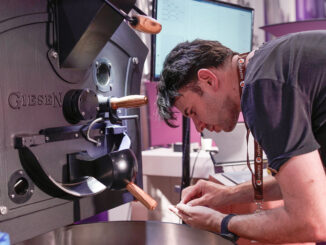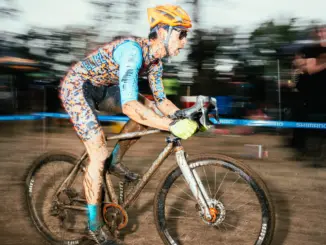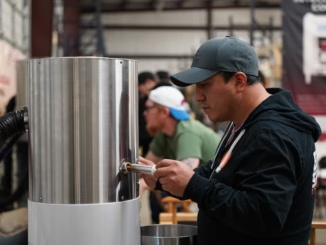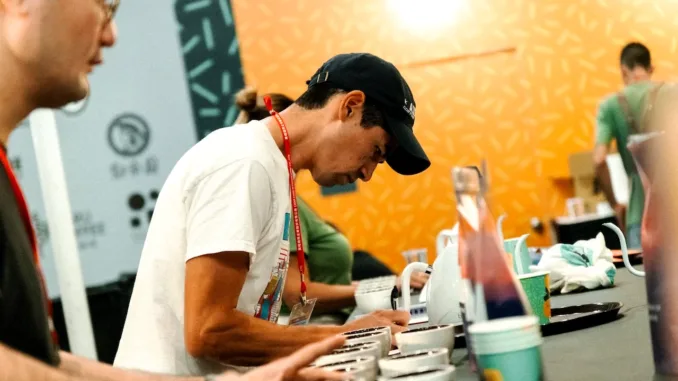
The Utah-based coffee roaster discusses how he prepared for last month’s World Coffee Roasting Championship in Taiwan, where he placed third.
Featured photo courtesy of World Coffee Events
This has been an eventful year for Andrew Coe. The coffee professional who owns Elevator Coffee Co. in Portland, Ore., moved from Portland to St. George, Utah, this summer, relocating his family while helping to run his coffee business remotely. On top of that, Andrew won the U.S. Roaster Championship in Portland in April, meaning that during these unusually busy months, he would also have to prepare for this fall’s World Coffee Roasting Championship.
The global competition is a three-part, four-day event that evaluates competitors on coffee grading, creating a roast profile, and the quality of their roasted coffee. The 2023 World Coffee Roasting Championship arrived last month—the Taiwan International Coffee Show hosted three World Coffee Championships events, including the roasting competition—and it was a special one for Andrew. He earned third place, the first time a U.S. competitor has placed in the top six at the event.
In the first half of this two-part interview, we talk to Andrew about his summer of preparation, why Taiwan is a special place for him, and his unique bond with his competition coach.
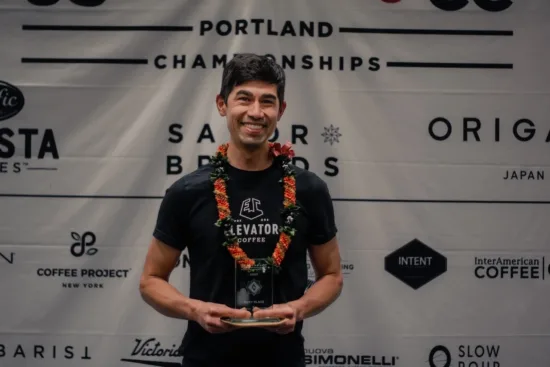
Barista Magazine: The World Coffee Roasting Championship is a bit different in format from the U.S. Roaster Championship. What are some of the main differences, and how did you prepare for them?
Andrew Coe: The competition structure is similar between the two competitions, but there were two new components for me at Worlds. The first being, instead of just roasting a single-origin coffee and presenting that to the judges, you also have to create a blend. You’re provided three separate coffees, and you have to use at least 10% of each of them in your blend. There isn’t a blend component like that at nationals. So this summer I spent some time thinking about blend composition and complementary flavors, as well as polar opposite flavors that can bring dynamism.
And then the other large change compared to the U.S. competition is at Worlds they reconstructed the roast plan to incorporate the new SCA Coffee Value Assessment cupping form. So the roast plan itself looked very different compared to nationals, and your accuracy score weighed much more heavily (at 2023 Worlds) based on that roast plan assessment versus our national competition. So that was another thing that I was really trying to familiarize myself with and get used to over the summer with cuppings; I tried my best to be prepared using that form.
You stayed prepared through cupping and roasting then?
I knew at Worlds they were going to throw four coffees at us to roast that I may or may not know anything about. I bought extra green coffee this summer just to put it in a roaster and see what it did. So I was taking one step at a time and doing the next thing to prepare and try to break it down, so it was just a daily, weekly, and monthly routine, instead of being such a monumental and daunting task.
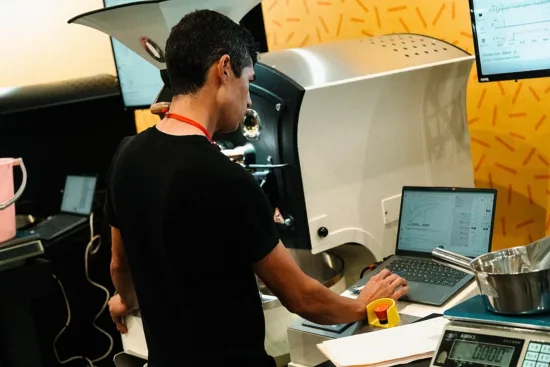
This was your second year competing, but your first on the international stage. What was it like for you to compete at Worlds in Taiwan?
Taiwan particularly is an important place for me because my dad grew up there. He was able to come on this trip with me and my family, and that made it all the more special. Completely outside of competition, it would have been a special trip just to go to Taiwan with him. But then having Worlds be there and having my whole family be able to attend and see parts of the roasting competition … it was a dream scenario.
And then, in terms of the level of competition, knowing that everyone you’re competing against is a national champion for their respective country, you definitely feel the weight of that. In a way you’re representing your whole community for what you do, and it’s almost hard to grasp. You get so few chances in your life to do something on a world level that it’s almost hard to contextualize it.
Your coach for Worlds, Alex Huang, competed against you at the U.S. Roaster Championship in Portland. Can you describe that relationship and partnership?
I met Alex at qualifiers in Denver. At qualifiers, you roast your coffee ahead of time, you do a presentation for the judges, and then you have an open service time where you have an airpot of your coffee and you’re serving it to anybody that’s there. Alex and I were sat next to each other for this open service, so we got to meet there in Denver, and then he did really well at finals (in Portland)—he got third.
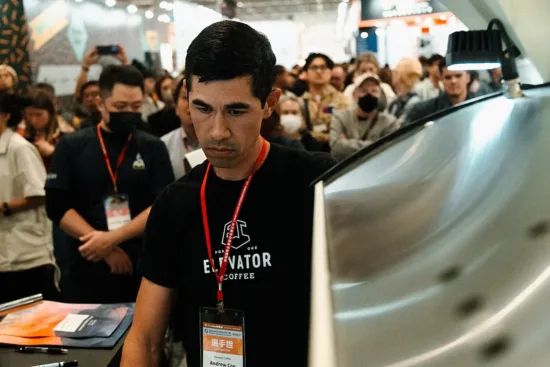
I thought about bringing a coach from over here for Worlds, but … I couldn’t afford flying somebody over to Taiwan and housing them for a week. Alex is based in Taiwan though, and so we got to talking and I said, “Do you want to coach me?” Mostly because I could use some help on the cupping table, I didn’t know the Giesen very well, and he has a six-kilo Giesen.
And so he was super helpful for coming up with a good roast plan, and knowing the particularities of the Giesen that I didn’t know very much about because I only got like a day of practice on it before competition. He definitely played a big part in the planning process and helping me with the roast plan accuracy notes and things like that.
Stay tuned for part two of this interview with Andrew on Monday.
Subscribe and More!
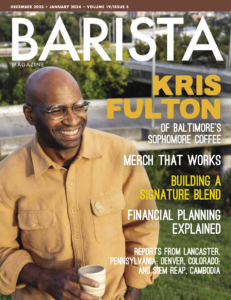
Out now: It’s the December 2023 + January 2024 issue! Read it for free with our digital edition. And for more than three years’ worth of issues, visit our digital edition archives here.
You can order a hard copy of the magazine through our online store here, or start a subscription for one year or two.


